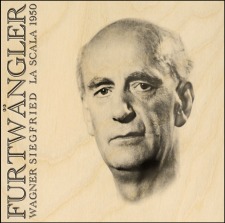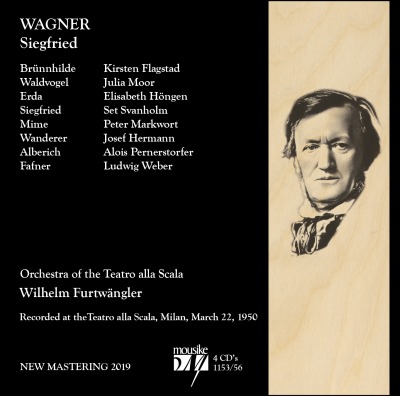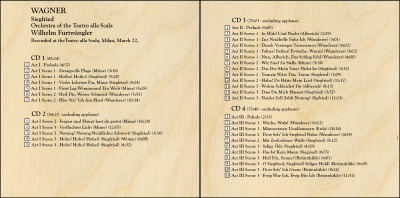 | Wagner Siegfried Kirsten Flagstad, Set Svanholm, Peter Markwort, Josef Hermann, Alois Pernerstorfer, Ludwig Weber, Julia Moor, Elisabeth Höngen La Scala Orchestra - 1950 $27 | |||
Now, about the singers. First of all, Flagstad and Frantz, as Brünnhilde and Wotan are unmatched. Frantz is better here than in Rome. It is a pity that in Siegfried, Wotan is sung by Josef Hermann. Although he is a fine singer, and he does an excellent Gunther in Götterdämmerung, he does not have the authority of Frantz. It has been said that Mödl is a more sensitive Brünnhilde than Flagstad, but I will take Flagstad’s divine voice any day. Yes, she is less “human”, but I think that is better for the role. I guess that people today prefer human frailty to heroic strength, but I am a Homer person myself. I actually like Achilles, so I prefer Flagstad. Another standout is Ludwig Weber as Fasolt, Hunding, the dragon Fafner and Hagen. The “bad guys” are very good in Rome, but I feel that Weber is in a class by himself. Hilde Konetzni as Sieglinde and Gutrune is wonderful, and so is Gunther Treptow as Siegmund. They make a loving and heroic couple, and Treptow often sings with a refreshing abandon that I prefer to Windgassen’s more standard interpretation. He is also a luxurious Froh in Rheingold. Excellent also is Elisabeth Höngen’s Fricka as well as Erda in Siegfried, and Pernerstorfer’s Alberich.
There has been more controversy with the roles of Siegfried and Mime. I will say that I much prefer Peter Markwort’s whiny, sniffling, malevolent Mime to Patzak’s polished but characterless interpretation. In Siegfried we have Set Svanholm as the young Siegfried and Max Lorenz in Götterdämmerung. In the Rome Ring, Ludwig Suthaus is excellent in both roles. Here, the Rome Ring has an edge, but the Milan tenors are not at all bad. Svanholm is actually very good for the young Siegfried, although he tires in the end. I like his exuberance until the final half hour. Lorenz is the way he is. I suppose you like him or hate him. I like him most of the time, although I would have preferred Suthaus. Considering the superiority for La Scala in most of the other important roles, I suppose putting up with Lorenz is not so difficult. And he is very, very good in the Third Act.
Doing this remastering has been very difficult. It is amazing how often there are changes in equalization and volume. Some of the changes in sound are impossible to correct, but I think that I have improved most cases. I wonder why this recording has been so tampered with. And there are tape damage problems in a few places, like Brünndilde’s awakening. But I am proud of the work done.
 |
 |